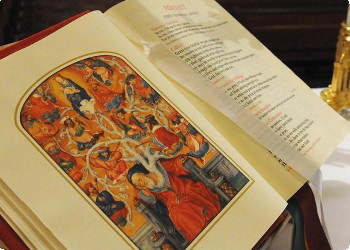You know neither me nor my Father
18 MARCH (Jn 8,12-20)
To know the Father, you must love him. He loves him who keeps his Commandments. Who dwells in the holy Law of God, abides in God, God abides in him, and from within he shows and makes him accept the divine and eternal truth he reveals him in history. It is always the God who is inside the man that helps a man see God that acts outside of a man. Jesus has revealed this truth in the Beatitudes: “Blessed are the pure in heart, for they shall see God.” The pure-hearted is the one who makes the Law of the Lord abide in his spirit, in his body and in his soul.
The Pharisees do not know of God, the God of Scripture, the God of Moses, the God of the Prophets. They do not know him because they are out of his Word, of his Commandments and his Statutes. Not having God within them, never might they know the God who acts, is revealed and manifests himself outside of them. It is God who always knows himself. The God who is on the inside knows the God who is outside. And the God who is on the outside lets himself be known by the God that is within. It is the one and only God who knows himself and lets himself be known. This truth is eternal. It is valid for yesterday, today and tomorrow.
Even today there is a great difficulty, almost impossible to know the God who acts outside of us. History, the teacher in the truths of the things concerning God, attests us that these impossibility and difficulty are generated by the non dwelling of God in the heart, mind, body and soul. One is without God. God is outside of us. Being outside of us, the principle for the knowledge of God that is outside of us, is missing in us. Not only we do not recognize him, we fight him, stating and supporting that he is not the true God. It could not be otherwise. The non knowledge of God testifies and reveals our sin.
Jesus spoke to them again, saying, “I am the light of the world. Whoever follows me will not walk in darkness, but will have the light of life.” So the Pharisees said to him, “You testify on your own behalf, so your testimony cannot be verified.” Jesus answered and said to them, “Even if I do testify on my own behalf, my testimony can be verified, because I know where I came from and where I am going. But you do not know where I come from or where I am going. You judge by appearances, but I do not judge anyone. And even if I should judge, my judgment is valid, because I am not alone, but it is I and the Father who sent me. Even in your law it is written that the testimony of two men can be verified. I testify on my behalf and so does the Father who sent me.” So they said to him, “Where is your father?” Jesus answered, “You know neither me nor my Father. If you knew me, you would know my Father also.” He spoke these words while teaching in the treasury in the temple area. But no one arrested him, because his hour had not yet come.
Today, Jesus is revealed to the Pharisees as the way to know the Father. The Father has only one and true revealer: Jesus. Jesus is the visible life of the Father. He is the visible heart. The visible will. The visible wisdom, visible mercy and visible light. Who wants to know the Father in his purest essence and truth; must pass through the knowledge of Jesus. He is the highest, the ultimate, the last manifestation of the Father. Moses showed something of the Father, and so also the other prophets. Jesus does not show anything. He reveals the Father in the fullness of truth, mercy, justice, holiness, charity, compassion, love and piety. Without Christ, out of Him, we truly know little of God. Rather we know almost nothing. We have a very imperfect knowledge.
This rule applies also to ecumenical and interreligious dialogue. Who follows with rightness with the law of truth written in his conscience and who lives the Gospel in all its provisions, necessarily will reach the fullness of the truth of Christ which is in the one, holy, catholic and apostolic Church. But when one does not follow the rectitude of conscience and does not live according to the dictates of the Gospel, then it becomes impossible to attain the fullness of the truth of Jesus Christ. We have neither God nor Christ within us and never can we get to the truth of Christ outside of us. This principle is universal. It always produces fruits of greater truth and justice. It leads to the reception of the true Christ. It opens the conscience to the fullness of revelation.
Virgin Mary, Mother of the Redemption, Angels and Saints make us true evangelical life.





